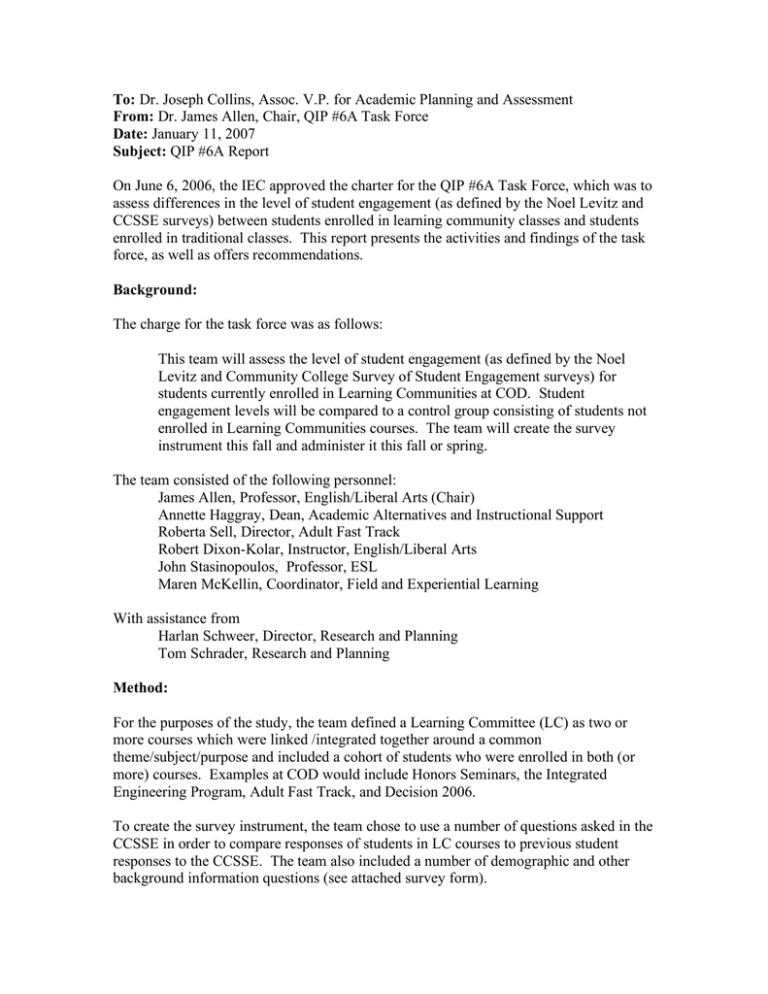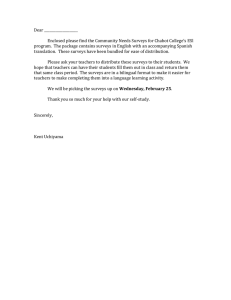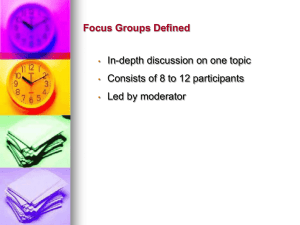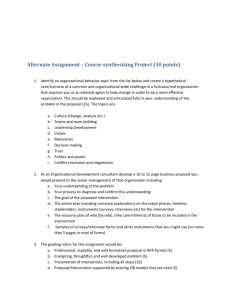To: From: Date: Subject:
advertisement

To: Dr. Joseph Collins, Assoc. V.P. for Academic Planning and Assessment From: Dr. James Allen, Chair, QIP #6A Task Force Date: January 11, 2007 Subject: QIP #6A Report On June 6, 2006, the IEC approved the charter for the QIP #6A Task Force, which was to assess differences in the level of student engagement (as defined by the Noel Levitz and CCSSE surveys) between students enrolled in learning community classes and students enrolled in traditional classes. This report presents the activities and findings of the task force, as well as offers recommendations. Background: The charge for the task force was as follows: This team will assess the level of student engagement (as defined by the Noel Levitz and Community College Survey of Student Engagement surveys) for students currently enrolled in Learning Communities at COD. Student engagement levels will be compared to a control group consisting of students not enrolled in Learning Communities courses. The team will create the survey instrument this fall and administer it this fall or spring. The team consisted of the following personnel: James Allen, Professor, English/Liberal Arts (Chair) Annette Haggray, Dean, Academic Alternatives and Instructional Support Roberta Sell, Director, Adult Fast Track Robert Dixon-Kolar, Instructor, English/Liberal Arts John Stasinopoulos, Professor, ESL Maren McKellin, Coordinator, Field and Experiential Learning With assistance from Harlan Schweer, Director, Research and Planning Tom Schrader, Research and Planning Method: For the purposes of the study, the team defined a Learning Committee (LC) as two or more courses which were linked /integrated together around a common theme/subject/purpose and included a cohort of students who were enrolled in both (or more) courses. Examples at COD would include Honors Seminars, the Integrated Engineering Program, Adult Fast Track, and Decision 2006. To create the survey instrument, the team chose to use a number of questions asked in the CCSSE in order to compare responses of students in LC courses to previous student responses to the CCSSE. The team also included a number of demographic and other background information questions (see attached survey form). The team chose to administer the survey at the end of the Fall 2006 semester to students in classes designated by the team as meeting the LC definition established above. We also requested that the instructors teaching these courses also administer a comparable survey to students in a traditional class taught by the same instructor. On the advice of the Learning Communities Committee, 300 additional surveys were given to students in traditional classes not being taught by faculty who were also teaching an LC course, in order to try to account for possible instructor influence.1 Findings: The surveys were administered between Dec. 4 and Dec. 18, with the results gathered and processed in early January. The results of the surveys are detailed in the attached report from the Office of Research and Planning (see attachment). In short, though, their report notes that “Students responding to the survey from the learning communities classes scored better on all 14 “engagement” items included on the survey than did students in the non-learning communities classes.” Further, it should be noted that students in LCs scored better overall that results from the 2003 CCSSE report that initiated this study. Discussion: As noted in the report from Research and Planning, the results of the survey appear to bear out the hypothesis that student engagement is enhanced within learning communities. However, it must be noted that there were some problems with smoothly administering the surveys and collecting them, due to various factors. Some faculty were confused or not fully informed about the purpose and/or methodology of the surveys. Many administered the surveys during Finals week, which delayed returning data. Given the encouraging results of the project, the team believes that greater understanding and a more efficient administration of the surveys will yield additional useful data. Recommendations: Because the surveys were administered to a fairly small sample of students, the team recommends repeating the survey during the Spring 2007 semester. This would also allow the team to refine and improve the administration of the survey, including better communication with faculty teaching LC courses as well as a more random method of selecting control groups. 1 The concern expressed by the committee was that faculty teaching LC courses may also use similar methods of engaging students in their traditional courses. It should be noted that the faculty recruited to administer this additional control group had, for the most part, been recently enrolled in a TLC course on Learning Communities.




